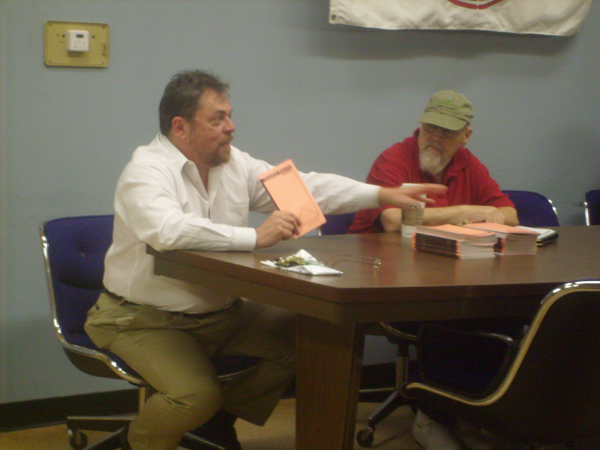
Imagine being in your bedroom when all of a sudden the door is thrown open and your landlord is standing in the doorway. In a rage, he tells you that you are being evicted and have an hour to leave. As you try to stuff all your belongings in your car, one question springs to mind. “Is this even legal?”
This type of situation was addressed at the monthly meeting of the Landlord-Tenant Relations Council, held in the New Paltz Village Hall. Assistant Attorney General Mark Hoops attended as a guest speaker to address both landlords and tenants about the laws and procedures involved when owning and renting property.
“One essential thing about this business is that one party owns the place.” Hoops said. “However, for value received (rent) the tenant is allowed to hold a piece of property and have certain rights within it.”
According to the New Paltz Tenant’s Rights Guide, these rights include privacy, barring landlords from entering an apartment without prior notice, and safety. Tenants must have working smoke and carbon monoxide detectors in their houses. The Tenant Bill of Rights and Responsibilities also has a non-discriminatory rule, stating that “landlords cannot refuse to rent to anyone or renew leases of … any person or group of persons because of race, creed, color, national origin, sex, disability, age, marital status, or familial status.”
Hoops also stated the importance of written leases over oral agreements when renting houses or apartments, explaining that a written lease is “a binding legal contract.” In cases where the rules in the contract are not followed, Hoops said it’s beneficial to have the lease as proof of what responsibilities were agreed upon by both parties when the property was first rented. If a landlord fails to act on his end of the bargain, Hoops said tenants can speak with their county’s building department.
Hoops also said that most friction between landlords and tenants happens because the people involved often mix business and personal relationships. The result, he said, is one party taking advantage of the other, and the other unwilling or unable to fight back.
Although the pamphlets handed out were titled “Tenant’s Rights Guide,” both landlords and tenants were vocal about their issues. When an audience member asked what he could do about having to pay for his tenants’ heat being wasted because they would leave their windows open throughout the winter, Hoops said that it would be legal to roll the extra expenses into their rent. Hoops also told the audience several lesser-known laws, such as the minimum temperature a landlord can make a house between October 15 and May 31. “68 degrees between 6a.m. to 10p.m. and 55 degrees between 10p.m. to 6a.m.,” he said.
Gianna Cioffi, a fourth year student at SUNY New Paltz, spoke about going to the building department when her previous apartment had bedbugs. She said her landlord was doing the bare minimum to get rid of them and it wasn’t working.
“The building department pressured him to do more, but he never got rid of them,” Cioffi remembers. “We moved out once our lease was up, but I don’t think the next people were aware of the problem.”
Cioffi recalled that one of her housemates was allergic to the bedbugs and would often wake up with blood on her sheets from the bites. Hoops advised the audience to be persistent in reporting problems and to have work requests in writing.
Doris Butterfield, a resident of Gardiner who is in the process of renting out two apartments for the first time, said that a few things mentioned surprised her. She was not previously aware that landlords had the right to perform a Comprehensive Loss Underwriting Exchange [C.L.U.E.] report, which summarizes relevant information of prospective tenants. Although she has not yet decided on tenants, she said she feels confident about becoming a landlord.
“Life is like a box of chocolates,” she said, “and there’s a lot of different people in the world.”
Ira Margolis, a tenant representative on the council, said that the ultimate goal is to raise awareness of both tenant and landlord rights in Ulster County. He admitted that the council could not do this completely, as the council still requires two more members, one tenant and one landlord, to have the seven members that the state requires for such a council.
